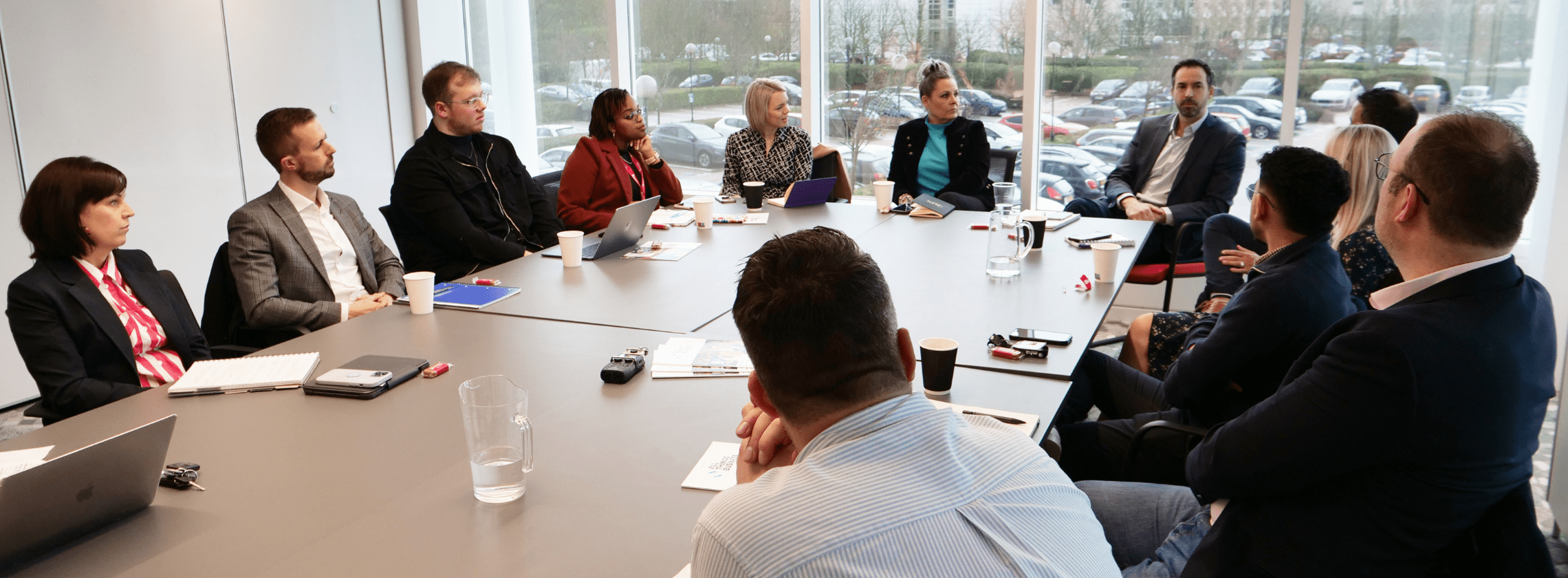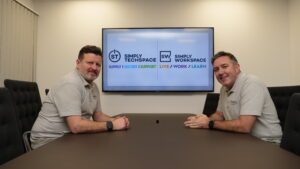It’s a changing world in recruitment – for those looking for work, who often have very different expectations from their predecessors – and for those looking to recruit, who need to understand not just what their company is looking for but how to appeal to a new workforce and to negotiate the complexities of employment law.
To find out more about the employment scene, from both sides, All Things Business, in conjunction with MHA, brought together a panel from the world of recruitment for its most recent Round Table.
Adrian Pryce, Associate Professor Strategy & Society CSBP at the University of Northampton was once again in the chair, facilitating the discussion that brought together Nikki Tilley and Gavin Henson from More Recruitment Group; Michael Greer, Senior Business Development Manager at Reed; Leanne Wilkins, Head of Talent and Acquisition and Resourcing, and Hamza Bhimani, Recruitment Advisor, both from MHA; and Greg Guilford from HR Solutions. They were joined by Beckie Goodridge from Colonial Construction in Northampton; Michael Nadin from the Employment Law department at DFA Law, Yvette Witcombe, Business Development Executive at Northampton College, and Frazer Arnott from All Things Business; as well as two University of Northampton students, Shani Mutarura who is studying for an MSc in Project Management, and Callum McDonagh, a BSc student in International Business Management.
Adrian Pryce began the discussion, which was hosted by Reed at its Northampton headquarters on the Brackmills Business Park, by asking about the role of the recruiter in ensuring clients found the right fit for their business.
Greg Guilford said: “From our side it’s largely about making sure our clients understand what they are recruiting for and that they have produced a good job description, with the qualifications and experience for the role. But it’s also about advice. Typically, when someone leaves, it’s natural to default to replacing like-for-like, but we always encourage clients to take time to consider the alternatives. The role may have changed, you may need someone with a different skills set, maybe an apprentice is the best route – so our part in the process is really HR advice and guidance.
Michael Greer agreed that an advisory approach was impor- tant. He said: “Clients may come to us with their idea of what they need but actually, it could be something quite different. We might help them deal with a whole range of things, often their issue is not recruitment but retention, so it might be how could we upskill their staff to go through the interview process better, so that when they are interviewing, they do a better job and hopefully ensure a better retention rate later on.”
Gavin Henson explained how the More Recruitment Solutions approach was to attempt to be consultative. “Some clients might resist, they often have a clear idea of what they want but we always find it’s good to open conversations from a different approach, just to cover all the possibilities.”
Looking at it from the other side of the process, Frazer Arnott said: “Recruitment is still a bit of an education for us, we’ve had mixed experiences when we’ve outsourced, but what we do find is that when we do it ourselves we do spend more time on it because we haven’t had candidates screened the way a recruitment partner would do it, and so it definitely costs us in terms of time and money.”
The discussion moved to what businesses could do to create a workplace culture that attracted new talent and then, most importantly, manage to retain it.
Student Callum McDonagh said: “From what I can see, it seems to always be the student who has to go out and search for a placement whereas I think that is something that could be of massive value, not only to the students but to the workplace. An employer may get someone who is currently studying undergrad or postgrad but who already has a decent amount of skills and experience. I worked in sales and marketing before I went to university, so I have those skills as well. There is too much shying away from young people because the perception is that they don’t have that skills set, but that’s not always necessarily true.
“But I also think that company culture is such a big thing these days. It’s about seeing a company that is just not a grey office, seeing a bit of personality that will become increasingly important.”
Yvette Witcombe agreed that the focus on company culture was key in recruitment, and how her role was to bring employers and candidates together. “Part of my role is to encourage employers to come in and talk to the young people. I have two companies, one in food processing and one in defence, and those two companies are incredible with their opportunities, education plans, development, and with everything they do with wellbeing for their people. But we do find that young people have never looked at the likes of a chicken factory or a military aircraft business as a potential employer, so it’s about the education, getting those types of firms in front of the young people and saying ‘these are the opportunities in my business’.”
Hamza Bhimani from MHA added: “Recruitment is about providing a business with adequate resource at all levels but also considering short-term and long-term impli- cations and balancing that with areas such as diversity, inclusion and ethnicity, which is increasingly important.”
Student Shani Mutarura spoke about the potential difficulties she faces as an overseas student when looking for a placement, or employment. She said: “It’s difficult, especially with visa charges, there’s a lot of anxiety because charges are high. I am from Kenya, so I need work visa sponsorship. Finding a placement is a challenge, with businesses wanting to know whether my skills set is transfer- able, or if I can adapt to the culture. The idea of having agencies come into schools is really good because it’s a big concern. I’ve had half my class transfer from the placement route because they feel there’s no guidance, they don’t really know what to do or what to expect.”
Nikki Tilley, who is Managing Director of More Driver Solutions, which largely recruits lorry drivers into temporary positions, said: “That’s interesting, and it comes back to educating employers. As a country, we’re bringing a lot of people in to go through our education system, but we are not telling employers what we are doing, or that these people are trained to the level you want. We are probably doing this ourselves – if we have a driver that doesn’t have a visa, we probably have to tell them they can’t drive for us, but we could educate ourselves more so we can explain to them what it is they need to do.”
Other sources of employment were discussed, with Beckie Goodridge explaining how Colonial Construction uses its partnerships and links with local sport, particularly rugby teams, as an employment pool for its construction business. She said: “Where we can, we encourage young players to go down an apprenticeship route, and we now have three apprentices. It starts at grassroots level for Colonial, it’s not ideal from a health and safety point of view, having school leavers or students going onto construction sites, but that’s something we need to overcome. Having people going through the apprenticeship process and then upskilling and supporting staff throughout their employment lifecycle is crucial.”
For MHA, contact with local schools is also vital. Leanne Wilkins said: “We can’t possibly hit every school so what we try to do is partner with two or three schools local to each of our offices and go in and support with mock interviews, talk to students and run insight events. We do as much as we can, using a score card approach ini nterviews, so they get the feedback they need.”
Ultimately, though, at the heart of successful recruitment is following the guidelines and ensuring procedures are in place to make the process fair to everyone, but it’s an area where businesses often need to take a ‘prevention is better than cure’ approach.
Michael Nadin from DFA Law said: “Employment law is ridiculously complicated sometimes, so employers need to make sure procedures are in place, that there is a paper trail. Employers need to be aware that if it goes wrong you might have to disclose evidence from the recruitment process and you could potentially be asked to justify every decision along the way. We are there to make sure the people involved are aware of that, that they have the correct training, and that they have access to the proper advice.”
Contact All Things Business and MHA.














